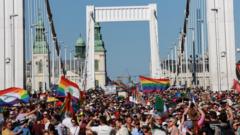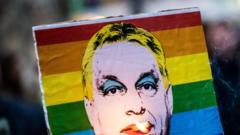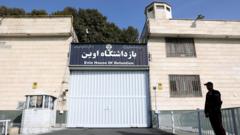#### Thousands gathered along the Danube to celebrate love and rights, challenging Prime Minister Orban's oppressive measures.
### Budapest Pride March Signals Protest Against Orban's Policies

### Budapest Pride March Signals Protest Against Orban's Policies
#### Massive turnout at Pride event conveys message of defiance against government restrictions.
Budapest's vibrant streets exploded with color and celebration as an estimated 100,000 to 200,000 participants took part in the annual Pride march this Saturday, defying government restrictions. This year’s event transformed from a simple LGBTQ celebration into a powerful rally advocating for human rights. The festive gathering stretched for hours across the iconic Elisabeth Bridge, symbolizing unity in resistance against the controversial measures imposed by Prime Minister Viktor Orban's government.
The backdrop of this year's Pride was the recent law that aimed to ban the event under the guise of child protection. Many attendees viewed the ban as a catalyst, motivating them to join a festival they might have otherwise skipped. Last year’s participation saw only 35,000, but this time, bold banners and t-shirts declaring messages against Orban’s administration filled the air. One poignant placard remarked, "In my history class, I learnt enough to recognize a dictatorship. You don’t need to illustrate it - Vik!" Meanwhile, another attendee cheekily donned a t-shirt featuring the prime minister in eye makeup, highlighting the spirited atmosphere.
Budapest's Mayor Gergely Karacsony embraced the moment, emphasizing the message of the march: “We don’t look as though we were banned!” Addressing a joyous crowd, he remarked that the march represented more than just a celebration of Pride; it was a stand for the freedoms that the government purportedly tried to suppress. His participation was seen as a bold defiance against Orban's administration, which had aimed to silence dissent with its questionable policies.
Among the notable attendees was Finnish MEP Li Andersson, who underlined the mass gathering as not solely about pride but a broader fight for fundamental rights. A law passed by Orban's Fidesz party equated homosexuality with pedophilia, inhibiting freedom of assembly and creating a hostile environment for LGBTQ voices. The police's subdued presence at the event suggested the government might be reconsidering its stance, although the vague threat of fines loomed over participants.
In contrast, state-run media criticized the March, branding it a spectacle of deviance rather than a display of lawful assembly. The upcoming court decisions will determine if the mayor's actions and the marchers' defiance will lead to changes in Orban's legislation or further entrench his regime's grip on power.
As the celebration rolled on, it became evident that the spirit of resilience within the LGBTQ community and its allies had made an indelible mark, urging a national conversation on tolerance and rights in Hungary.




















